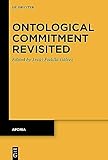Ontological Commitment Revisited / ed. by Jesús Padilla Gálvez.
Material type: TextSeries: Aporia ; 13Publisher: Berlin ; Boston : De Gruyter, [2021]Copyright date: ©2021Description: 1 online resource (V, 159 p.)Content type:
TextSeries: Aporia ; 13Publisher: Berlin ; Boston : De Gruyter, [2021]Copyright date: ©2021Description: 1 online resource (V, 159 p.)Content type: - 9783110749991
- 9783110750119
- 9783110750041
- 111 23
- BD311 .O58 2021
- online - DeGruyter
- Issued also in print.
| Item type | Current library | Call number | URL | Status | Notes | Barcode | |
|---|---|---|---|---|---|---|---|
 eBook
eBook
|
Biblioteca "Angelicum" Pont. Univ. S.Tommaso d'Aquino Nuvola online | online - DeGruyter (Browse shelf(Opens below)) | Online access | Not for loan (Accesso limitato) | Accesso per gli utenti autorizzati / Access for authorized users | (dgr)9783110750041 |
Browsing Biblioteca "Angelicum" Pont. Univ. S.Tommaso d'Aquino shelves, Shelving location: Nuvola online Close shelf browser (Hides shelf browser)
Frontmatter -- Contents -- Ontological Commitment: An Introduction -- Meinong’s Objectives -- Metaphysical Aspects of Agency -- Representation as Ontological Problem -- Ontological Commitment and State of Affairs -- “I know” Language-games in Wittgenstein’s Late Philosophy -- Against Propositional Substantivism -- Wittgenstein’s Nachlass, a Case for Practical Ontology? -- Paradox in Ontology: Black Holes, Cosmology, Wittgenstein versus Stephen Hawking’s Claim that Philosophy is Dead -- List of Contributors -- Index of Names -- Subject Index
restricted access online access with authorization star
http://purl.org/coar/access_right/c_16ec
Ontological commitment implies that each theory is supposed to specify the type of entities that form its components. Representatives of a theory share an ontological commitment in relation to the objects they refer to. There are theories that admit the existence of universals while others do not. As there are different ways of speaking about universals it is necessary to decide what a universal term corresponds to. It is essential to have a criterion that enables us to decide which kinds of objects are allowed as references for the terms used. In this volume two different approaches are discussed: first, in cases where only extensional languages are accepted; second, when intensional elements are required to determine the meaning such terms as "Sachverhalt", intentional statements or representations. The ontological commitment associated with extensional theories exclusively admits the existence of physical objects, whereas intensional theses additionally include universal and abstract entities. The study of ontological commitment enables us to measure the ontological economy of theories. This serves as a basis for the choice of theory. The authors of this volume discuss relevant issues of both models and provide new solutions.
Issued also in print.
Mode of access: Internet via World Wide Web.
In English.
Description based on online resource; title from PDF title page (publisher's Web site, viewed 28. Feb 2023)









